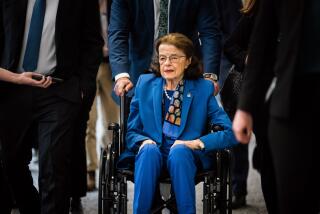Former Employees of Heiress Contest Legality of Will : Courts: Chef and housekeeper say Doris Duke was incompetent when she signed two codicils that made her butler the chief executor of her $1.2-billion estate.
- Share via
NEW YORK — Two former employees of tobacco heiress Doris Duke charged Friday that she was incompetent when she signed amendments to her will in a Los Angeles hospital bed in the spring of 1993, making her butler her chief executor.
Colin Shanley, who was Duke’s chef, and Ann Bostich, who was her housekeeper, alleged in court papers filed in Manhattan that the heiress and philanthropist was in such a weakened condition that a lawyer had to guide her hand while she signed her will and two codicils during a two-month stay in Cedars-Sinai Medical Center.
Under the disputed will, Bernard Lafferty, who served as Duke’s butler and adviser, is to receive a $5-million executor’s fee and a lifetime annuity of $500,000 a year while serving as co-executor of Duke’s $1.2-billion estate along with United States Trust Co. of New York.
The account of the former employees--who are suing Lafferty and two lawyers representing the estate and a Chicago law firm for breach of contract and intentional infliction of emotional distress--contrasts sharply with the statements of other witnesses to the signings.
The other witnesses, including two doctors who treated Duke, described the 80-year-old billionaire as an active participant in changing her will.
The contrasting versions are part of an escalating court battle as various parties seek control of a fortune that will become one of America’s largest charitable foundations.
In his affidavit, Shanley charged: “Based upon my observations of Miss Duke . . . I firmly believe that any will that she signed which named Lafferty as a fiduciary was the product of coercion and undue influence on his part or was signed when she did not understand what she was doing.”
Shanley also alleged that one of Duke’s Beverly Hills doctors, plastic surgeon Harry Glassman, removed some hospital records for the dates she signed the documents--and that Lafferty told him that was because the documents wouldn’t look good in the future “if people were going to start contesting the will.”
Glassman’s attorney, Stanley S. Arkin, denied that the physician “messed with records” in any way.
Glassman “conducted himself in a pristine way,” Arkin said Friday.
The new charges drew a rebuttal from Lafferty’s attorney.
“The preposterousness of all these allegations (is) going to play out,” said Howard L. Weitzman, who also is representing the Duke estate.
Weitzman attributed the allegations to ex-employees who are attempting to generate scandal “to get money from the estate (of a) person who didn’t care to give them anything.”
Weitzman noted that “a number of people” witnessed Duke’s signing of the will and other legal documents, and have sworn that “she was competent and that her signature was voluntary.”
Bostich’s affidavit alleges that after a stroke in February, 1993, Duke had episodes of disorientation during which she was not capable of understanding what was happening around her.
“Prior to her February stroke, Miss Duke at one point woke up and thought she was in Brooklyn,” the housekeeper explained. “From that point on, when the household staff referred to her confusion or disorientation, we would say, ‘She’s in Brooklyn.’ ”
Bostich said that in March, 1993, she was asked to serve as a witness to a codicil that was being signed by the heiress in her hospital room under the direction of William Doyle, a Chicago lawyer supervising the revision of her will.
“Doyle gave Miss Duke the document which he wanted her to sign,” Bostich said. “Miss Duke appeared to start to sign the document, but Doyle stopped her. Doyle said, ‘Let me put my briefcase on your lap.’ Doyle then did so. He slid his own hand under her wrist. He propped her hand up with his hand. Doyle then pushed her hand along the page, guiding the hand” that held the pen.
In his affidavit, Shanley said he witnessed similar scenes when he was summoned to Duke’s hospital room to witness the signing of two codicils, amendments to a will.
A Manhattan Surrogate’s Court investigator and Los Angeles police detectives are examining the circumstances of Duke’s death on Oct. 28, 1993, after charges by one of her nurses that she “did not die of natural causes.” Duke’s physicians have strongly denied that allegation.
Goldman reported from New York, Lieberman from Los Angeles
More to Read
Inside the business of entertainment
The Wide Shot brings you news, analysis and insights on everything from streaming wars to production — and what it all means for the future.
You may occasionally receive promotional content from the Los Angeles Times.










